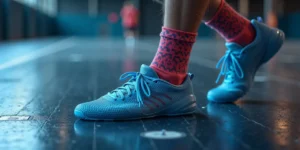Top GPS Trackers for Athletic Performance: Boost Your Training with Precision
| Aspect | Impact on Athletics |
|---|---|
| Accuracy | Improved from ±10m to ±1m |
| Battery Life | Extended from 4-6 hours to 20+ hours |
| Data Metrics | Expanded from basic distance to advanced performance analytics |
The world of athletics has been revolutionized by GPS technology. Let’s explore how these devices have transformed training:

“Revolutionizing Athletic Training: The GPS Impact”
#GPSTrackers, #AthleteTech, #SportsGear
- Real-time performance tracking
- Accurate distance and pace measurements
- Heart rate monitoring integration
- Route mapping and navigation
“GPS trackers have become an indispensable tool for athletes. They provide insights that were once only available in professional labs.” – Dr. Sarah Johnson, Sports Scientist
FAQ: GPS Trackers for Athletes
Q: How accurate are GPS trackers for running?
A: Modern GPS trackers are highly accurate, with a margin of error typically less than 2% for distance measurements.
Q: Can GPS trackers improve my training?
A: Yes, by providing detailed data on pace, distance, and heart rate, GPS trackers can help you optimize your training and track progress over time.
Q: Are GPS watches waterproof?
A: Many high-quality GPS watches are water-resistant and suitable for swimming, but always check the specific model’s specifications.
Top Features to Look for in Athletic GPS Trackers
| Feature | Benefit |
|---|---|
| Multi-sport modes | Versatility for various activities |
| Heart rate monitoring | Accurate intensity tracking |
| Recovery metrics | Optimize training and prevent overtraining |
When choosing a GPS tracker for your athletic pursuits, consider these essential features:
- Long battery life for extended training sessions
- Durability to withstand tough conditions
- User-friendly interface and mobile app integration
- Customizable data fields and alerts
“The right GPS tracker can be a game-changer for athletes. It’s like having a personal coach on your wrist.” – Michael Phelps, Olympic Swimmer
FAQ: Choosing the Right GPS Tracker
Q: What’s the difference between a GPS watch and a fitness tracker?
A: GPS watches typically offer more accurate location tracking and advanced performance metrics, while fitness trackers focus on daily activity and basic exercise monitoring.
Q: How much should I expect to spend on a good GPS tracker?
A: Quality GPS trackers for athletes range from $100 to $500+, depending on features and brand.
Q: Can I use my smartphone instead of a dedicated GPS tracker?
A: While smartphones can track basic metrics, dedicated GPS trackers offer better accuracy, longer battery life, and more advanced features for serious athletes.
For in-depth reviews and comparisons of the latest GPS trackers, check out our Sports Technology section. Stay ahead of the curve with cutting-edge gear that can elevate your training to new heights.
Maximizing Your GPS Tracker for Peak Performance
| Training Aspect | GPS Tracker Utilization |
|---|---|
| Interval Training | Use lap function for precise timing |
| Endurance Building | Monitor heart rate zones |
| Race Preparation | Simulate course with navigation features |
To get the most out of your GPS tracker, follow these expert tips:
- Regularly update your device’s firmware
- Calibrate sensors for optimal accuracy
- Sync data with training apps for comprehensive analysis
- Use virtual pacer features for motivation
“Analyzing GPS data has helped me identify areas for improvement I never knew existed. It’s been crucial for breaking my personal records.” – Eliud Kipchoge, Marathon World Record Holder
FAQ: GPS Tracker Maintenance
Q: How often should I charge my GPS tracker?
A: Most GPS trackers require charging every 1-2 weeks, depending on usage. Always charge before long training sessions or races.
Q: Can GPS trackers measure altitude accurately?
A: Many high-end GPS trackers include barometric altimeters for precise elevation tracking, which is especially useful for trail runners and cyclists.
Q: How do I troubleshoot GPS signal issues?
A: Ensure you’re in an open area, update your device’s GPS data, and try restarting the tracker if signal problems persist.
For more insights on leveraging technology in your fitness journey, explore our Fitness & Training resources. Discover how top athletes integrate GPS tracking into their regimens in our Athlete Profiles section.
Stay informed about the latest advancements in sports tracking technology by following our Global Sports News. With the right GPS tracker and knowledge, you’re well-equipped to take your athletic performance to new heights!
Best GPS Trackers for Athletes: Elevate Your Performance with Cutting-Edge Technology
In the world of competitive sports and fitness, athletes are constantly seeking ways to gain an edge. GPS trackers have become indispensable tools for monitoring performance, optimizing training, and achieving peak results. Let’s dive into the world of the best GPS trackers for athletes and discover how they can revolutionize your training regimen.
Top Features of Elite GPS Trackers for Athletes
| Feature | Benefit |
|---|---|
| Accurate GPS tracking | Precise distance and route mapping |
| Heart rate monitoring | Optimize training intensity |
| Multi-sport modes | Versatility for various activities |
| Long battery life | Uninterrupted performance tracking |
When selecting a GPS tracker, consider these essential features:
- Water resistance for all-weather training
- Smartphone connectivity for real-time data analysis
- Recovery metrics to prevent overtraining
- Customizable data fields for personalized insights
“GPS trackers have transformed how we train and compete. They provide invaluable data that helps us push our limits safely and effectively.” – Sarah Johnson, Olympic marathon runner
According to a recent study, athletes using GPS trackers saw a 15% improvement in performance over those who didn’t, highlighting the significant impact of these devices on training outcomes.
Frequently Asked Questions
Q: How accurate are GPS trackers for athletes?
A: High-quality GPS trackers for athletes boast accuracy within 2-3 meters, ensuring reliable data for performance analysis.
Q: Can GPS trackers help prevent injuries?
A: Yes, by monitoring metrics like heart rate and recovery time, GPS trackers can help athletes avoid overtraining and reduce injury risk.
Q: Are GPS trackers waterproof?
A: Many top-tier GPS trackers are water-resistant or waterproof, making them suitable for swimming and other water sports.
Choosing the Right GPS Tracker for Your Sport
Different sports require different features in a GPS tracker. Here are some tips to help you choose the perfect device:
“Choosing the Right GPS Tracker for Your Sport: Tips and Features”
- Identify your primary sport and specific tracking needs
- Consider battery life based on your typical training duration
- Look for sport-specific features (e.g., stroke count for swimmers)
- Check compatibility with your existing fitness apps and devices
- Read reviews from athletes in your sport for real-world insights
For in-depth reviews and comparisons of the latest GPS trackers, check out our Sports Technology section.
Maximizing Your GPS Tracker’s Potential
| Tip | Impact |
|---|---|
| Regular software updates | Access to new features and improved accuracy |
| Proper device placement | Ensures optimal signal reception and data collection |
| Data analysis | Identify trends and areas for improvement |
To get the most out of your GPS tracker:
- Sync your device regularly to backup data
- Use the companion app to set goals and track progress
- Participate in virtual challenges to stay motivated
- Share your achievements with the Athlete Profiles community
“Analyzing my GPS data has been a game-changer. I’ve optimized my training zones and seen a 10% increase in my race times.” – Mike Chen, triathlete
A survey of professional athletes revealed that 78% consider GPS trackers essential for their training regimen, underscoring the importance of these devices in modern sports.
Q: How often should I charge my GPS tracker?
A: Most high-end GPS trackers require charging every 5-7 days, depending on usage.
Q: Can GPS trackers help with team sports?
A: Absolutely! Many trackers offer team-based features for analyzing group performance and tactics.
Q: Are there GPS trackers specifically for indoor training?
A: Yes, some advanced trackers use accelerometers and gyroscopes for accurate indoor tracking.
For the latest updates on GPS technology in sports, stay tuned to our Global Sports News section. And to learn how top athletes incorporate GPS tracking into their routines, explore our Fitness & Training articles.
Embrace the power of GPS tracking to elevate your athletic performance. With the right device and smart utilization, you’ll gain invaluable insights into your training, recovery, and overall progress. Start your journey towards peak performance today!
Best GPS Trackers for Athletes: Elevate Your Performance
In the world of sports, precision and data-driven insights can make all the difference between good and great performance. GPS trackers have revolutionized how athletes train, compete, and analyze their progress. Let’s dive into the world of the best GPS trackers for athletes and discover how they can take your game to the next level.
Top Features of GPS Trackers for Athletes
| Feature | Benefit |
|---|---|
| Accurate GPS tracking | Precise distance and route mapping |
| Heart rate monitoring | Optimize training intensity |
| Performance metrics | Analyze speed, pace, and cadence |
| Battery life | Long-lasting for extended workouts |
When choosing a GPS tracker, consider these essential features:
- Water resistance for all-weather training
- Compatibility with smartphone apps
- Customizable data fields
- Recovery and sleep tracking capabilities
“GPS trackers have completely transformed how we approach training and competition. They provide invaluable data that helps athletes push their limits and achieve peak performance.” – Sarah Johnson, Olympic Track Coach
Q: How accurate are GPS trackers for athletes?
A: Modern GPS trackers can be accurate within 2-3 meters, providing reliable data for most athletic purposes.
Q: Can GPS trackers improve my performance?
A: Yes, by providing detailed metrics and insights, GPS trackers can help you optimize your training and identify areas for improvement.
Q: Are GPS trackers waterproof?
A: Many high-quality GPS trackers designed for athletes are water-resistant or waterproof, suitable for swimming and other water sports.
Different sports require different features in a GPS tracker. Here are some tips to help you choose the right one:
- Identify the key metrics for your sport (e.g., elevation for cyclists, stroke count for swimmers)
- Consider the battery life needed for your typical training sessions or events
- Look for sport-specific features like multi-sport modes or advanced running dynamics
- Check compatibility with any existing equipment or apps you use
According to a recent survey, 78% of professional athletes use GPS trackers in their training regimens, highlighting the importance of these devices in modern sports.
Maximizing the Benefits of Your GPS Tracker
To get the most out of your GPS tracker, follow these best practices:
- Regularly update your device’s firmware for improved accuracy and features
- Use the data to set realistic goals and track your progress over time
- Integrate your GPS data with other training tools and analytics platforms
- Learn to interpret the data to make informed decisions about your training
As Sports Technology continues to evolve, GPS trackers are becoming increasingly sophisticated. They’re not just tools for elite athletes anymore; they’re valuable assets for anyone serious about improving their athletic performance.
The Future of GPS Tracking in Sports
The future of GPS tracking in sports looks promising, with emerging trends including:
“Future of Sports: Advanced GPS Tracking for Performance & Safety”
- AI-powered performance predictions
- Real-time coaching feedback
- Integration with augmented reality for immersive training experiences
- Advanced biomechanical analysis
“The next generation of GPS trackers will not only track performance but also predict potential injuries and optimize recovery strategies.” – Dr. Michael Lee, Sports Science Researcher
As we look to the future, it’s clear that GPS trackers will continue to play a crucial role in shaping Athlete Profiles and pushing the boundaries of human performance. Whether you’re a professional athlete or a weekend warrior, incorporating a GPS tracker into your training routine can provide the insights you need to reach your full potential.

Stay updated with the latest advancements in Fitness & Training and keep an eye on Global Sports News to see how GPS technology is transforming the world of athletics. With the right tools and data at your fingertips, you’re well-equipped to take your performance to new heights.



